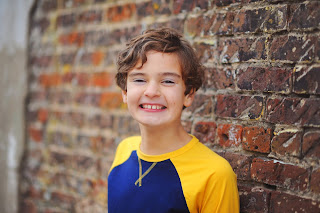IVIG #15- Two years of our life
Here we are. IVIG #15. We started this journey two years ago yesterday. I remember sitting here, on my father-in-law's birthday, wondering if we had made the right choice. February 10th had always been a special day in our family, celebrating the amazing father and grandfather who has been so supportive in our decisions, our fight, and our lives.
And now February 10th will always be the day that add a new celebration- a second chance at life with Hunter.
Two years ago, I didn't think we would ever see the light at the end of the tunnel. We were so deep in behaviors, non-compliance, aggression. If you take your worst behavior day, with all of your kids combined- that was the life we were living 24 hours/day. When he wasn't engaged in bad behavior or anger, he was waking up in the middle of the night, raging, kicking the wall...so even in the moments that we were supposed to find relief, we couldn't escape the disease that had overtaken our lives.
Two years ago, I wouldn't have honestly been able to tell you that he would be functioning in a typical classroom. It was always my hope, but that period of time was so dark, so depressing... it was hard to escape the reality of the situation.
Two years ago, I wouldn't have guessed we would still be here, in this same hospital room, with the same nurses...
and the same journey.
Two years ago, I wouldn't have had the courage to tell you that I was so, so scared. That I had so many doubts. SO much anger. So much sadness. So many confusing thoughts about this life we were living.
But today, two years later, I am able to tell you that I am still scared. Scared of what the future holds. Scared that we will be sitting with this IV pole strapped to us for many, many more years.
And I am still angry at times. Still sad. But I don't know if I will ever not hold onto some of the "what ifs," even if we reached 100% recovery.
When we met with Dr. G a couple of weeks ago, he had other plans for this journey. Hunter was actually running a small fever when we saw him, and as Hunter engaged in amazing, excitable conversation, I told him, "This is Hunter on a fever." He finally was able to see him when his immune system was functioning normally. After not having fevers for 4 years, we always celebrate them!
Dr. G agreed that this little regression was good for us to determine the next course of action. He told us there were several options after this round:
1) If there was no dramatic change in behavior reported by school staff/us then stay with the 3 month intervals. Classic spacing for IVIG is 3 months apart for maintenance intervals.
Does that mean we have reached our plateau? Not sure.
2) If there is a change with IVIG, then there are three more options:
a) Stay with the 3 month interval
b) Pull back and go every 10-11 weeks, since that is the current time frame that we notice him slipping
c) Attempt a different method.
Scary. We didn't expect him to bring up another route. He thought we could revisit trying the Rituxan, Citoxan (we would use 1/10 of the dosage that they use for chemo patients), or Plasmapharesis (taking out and cleaning, putting back in). He said with the first two chemo-type drugs, the immunosuppression is transient. He said that the IVIG is keeping a lid on things- but for the long-term, he is thinking we should try something a little more aggressive. The Rituxan lasts for 6 months, and it would wipe out his B cells in the hope that they regenerate healthy.
So if IVIG shows us a big change this round, after regression, do we up the ante?
Dr. G said we have controlled the fire enough and his brain has allowed him to mature...and we get to habilitate those skills that have been missing.
I asked him if there was a window, if we had missed a critical period, to continue to make improvements. He said, NO! There is still Synoptic Pruning, which refers to the process by which extra neurons and synaptic connections are eliminated in order to increase the efficiency of neuronal transmissions. I found this interesting article after doing a google search:
W YORK, NY (August 21, 2014) — Children and adolescents with autism have a surplus of synapses in the brain, and this excess is due to a slowdown in a normal brain “pruning” process during development, according to a study by neuroscientists at Columbia University Medical Center (CUMC). Because synapses are the points where neurons connect and communicate with each other, the excessive synapses may have profound effects on how the brain functions. The study was published in the August 21 online issue of the journal Neuron.
During normal brain development, a burst of synapse formation occurs in infancy, particularly in the cortex, a region involved in autistic behaviors; pruning eliminates about half of these cortical synapses by late adolescence. Synapses are known to be affected by many genes linked to autism, and some researchers have hypothesized that people with autism may have more synapses.

Neurons in brains from people with autism do not undergo normal pruning during childhood and adolescence. The images show representative neurons from unaffected brains (left) and brains from autistic patients (right); the spines on the neurons indicate the location of synapses. (Image: Guomei Tang and Mark S. Sonders/CUMC)
...By late childhood, she found, spine density had dropped by about half in the control brains, but by only 16 percent in the brains from autism patients.
“It’s the first time that anyone has looked for, and seen, a lack of pruning during development of children with autism,” Dr. Sulzer said, “although lower numbers of synapses in some brain areas have been detected in brains from older patients and in mice with autistic-like behaviors.”
Clues to what caused the pruning defect were also found in the patients’ brains; the autistic children’s brain cells were filled with old and damaged parts and were very deficient in a degradation pathway known as “autophagy.” Cells use autophagy (a term from the Greek for self-eating) to degrade their own components.
Reading through the article above, especially the part I highlighted, makes me think that with our PANDAS/Autoimmune Encephalitis patients, whose brain development was altered when the body started attacking healthy tissue, have experienced this autophagy- degrading their own healthy components.
Science is fascinating. I just wish the researchers would hurry up so that we can find answers.
Dr G also agreed with a suggestion to re-run blood markers, but he would have to be off of IVIG for 4 months to not skew results. He is getting antibodies from 2000 donors, so he would need to pass that 3-month maintenance mark to give true results. If we can handle the extra few weeks of regression, then we could run blood this summer to attempt to find that autoantibody responsible for causing the change.
My head spins just writing about a possible course change- after working so hard to get here, are we ready to get even more aggressive?
And I have to admit, I like what I am seeing already. Today is the last day of round 15, and I'm happy to have my smiling boy back.
Our little Valentine's party
Delivering valentine's to the nursing home patients
Daddy Daughter Dance with soccer friends
A sorry note- he is doing amazing with writing/drawing his feelings, when it isn't easy to express. He spit a raspberry at a teacher when she told him to get off the swings, so he wrote, "Sorry for spitting, I'll try again next time." And then his picture- he is on the swing with a sad face. I wish this kid could just express he is sad instead of engaging in poor behavior. :(
Practicing his name in mommy school.
Daddy Daughter Dance #2 with her Indian Tribe Friends
 |
| love, love this smile |


















Comments
Post a Comment